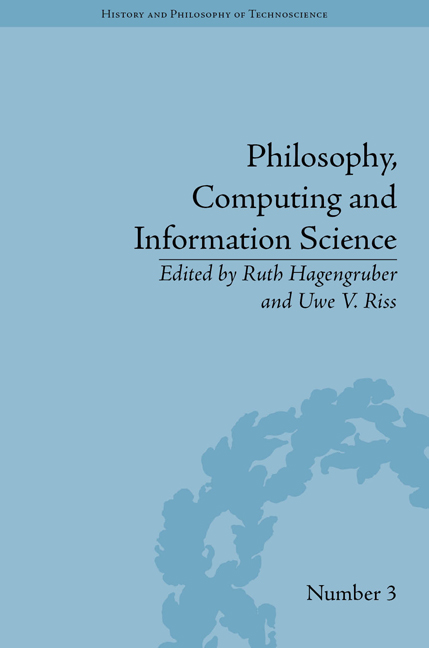Book contents
- Frontmatter
- CONTENTS
- List of Contributors
- List of Figures and Tables
- Introduction: Philosophy's Relevance in Computing and Information Science
- Part I Philosophy of Computing and Information
- Part II Complexity and System Theory
- Part III Ontology
- Part IV Knowledge Representation
- Part V Action Theory
- Part VI Info-Computationalism
- 17 Info-Computationalism and Philosophical Aspects of Research in Information Sciences
- 18 Pancomputationalism: Theory or Metaphor?
- Part VII Ethics
- Notes
- Index
18 - Pancomputationalism: Theory or Metaphor?
from Part VI - Info-Computationalism
- Frontmatter
- CONTENTS
- List of Contributors
- List of Figures and Tables
- Introduction: Philosophy's Relevance in Computing and Information Science
- Part I Philosophy of Computing and Information
- Part II Complexity and System Theory
- Part III Ontology
- Part IV Knowledge Representation
- Part V Action Theory
- Part VI Info-Computationalism
- 17 Info-Computationalism and Philosophical Aspects of Research in Information Sciences
- 18 Pancomputationalism: Theory or Metaphor?
- Part VII Ethics
- Notes
- Index
Summary
Prelude: Some Science Fiction on the Ultimate Answer and The Ultimate Question
Many many millions of years ago a race of hyperintelligent pan-dimensional beings (whose physical manifestation in their own pan-dimensional universe is not dissimilar to our own) got so fed up with the constant bickering about the meaning of life which used to interrupt their favourite pastime of Brockian Ultra Cricket (a curious game which involved suddenly hitting people for no readily apparent reason and then running away) that they decided to sit down and solve their problems once and for all.
And to this end they built themselves a stupendous super computer …
‘O Deep Thought computer’, Fook said, ‘the task we have designed you to perform is this. We want you to tell us … ’ he paused, ‘the Answer!’
‘The Answer?’ said Deep Thought. ‘The Answer to what?’
‘Life!’ urged Fook. ‘The Universe!’ said Lunkwill.
‘Everything!’ they said in chorus.
(At this point the whole procedure is interrupted by two representatives of the ‘Amalgamated Union of Philosophers, Sages, Luminaries and Other Thinking Persons’ who demand to switch off the machine because it endangers their jobs. They demand ‘rigidly defined areas of doubt and uncertainty!’, and threaten: ‘You’ll have a national Philosopher’s strike on your hands!’ . . . )
- Type
- Chapter
- Information
- Philosophy, Computing and Information Science , pp. 213 - 222Publisher: Pickering & ChattoFirst published in: 2014



